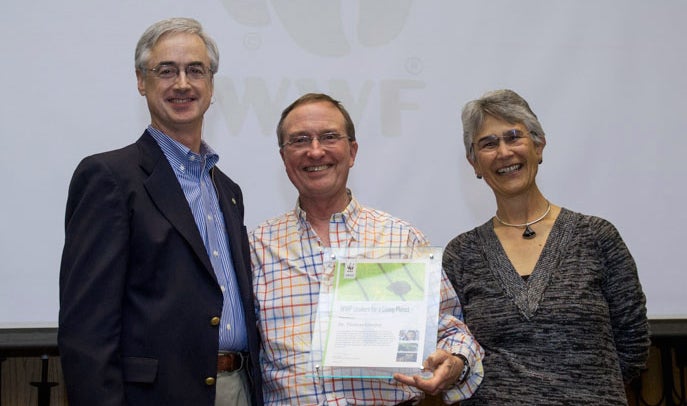Dr. Thomas E. Lovejoy is the first Biodiversity Chair of the H. John Heinz III Center for Science, Economics and the Environment. He is also a University Professor of Environmental Science and Policy at George Mason University. He currently is Chair of the Scientific Technical Advisory Panel (STAP) for the Global Environment Facility (GEF), the multibillion dollar funding mechanism for developing countries in support of their obligations under international environmental conventions.
-----

Thomas Lovejoy, University Professor of Environmental Science and Policy at George Mason University, was awarded the 2013 World Wildlife Fund Leaders for a Living Planet Award this week at a ceremony at the 2013 WWF Annual Conference at the Jackson Lake Lodge in Grand Teton National Park, Wyo.
The award recognizes environmental leadership and outstanding and inspirational work in conservation.

Lovejoy’s career spans multiple decades and includes many creative and important contributions to research on the severe impact of land use on biodiversity and ecosystems. He began his career in the mid-1960s, researching ecosystems in the Amazon rainforest. This led to the Biological Dynamics of Forest Fragments Project, the largest long-term experiment in the history of landscape ecology. Now in its 33rd year, the project was responsible for showing that fragmentation of animal habitats is one of the greatest threats to biodiversity, along with climate change.
Lovejoy was one of the first to point out that the Amazon rainforest was in crisis, and he was a pioneer in educating the public about this problem. His work in policy included the first published projection of global extinction rates.
Thomas Lovejoy
Lovejoy also developed “debt-for-nature swaps,” in which a portion of a nation’s foreign debt is forgiven in exchange for investments in conservation. Debt-for-nature swaps are now among the largest sources of financing to support international environmental projects.
In 2012, he was awarded the 21st annual Blue Planet Prize, the international environmental award sponsored by the Asahi Glass Foundation in Japan. In 2011, along with other environmentalists, he was awarded the first Joao Pedro Cardoso Medal of the State of Sao Paulo, Brazil, for his work worldwide in conservation and environmental policy.
Alexandre Pinheiro Rego
Senior Communications Officer
arego@thegef.org